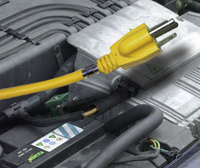China Looks to Electrify Our Cars
Special From Seeking Alpha
by: Jeff Siegel
April 19, 2009 At the bottom of a recent New York Times article about China's burgeoning electric vehicle market, I found quite a few hostile comments. Most seemed to be nationalistic in tone, and questioned why we should rely on China for electric cars when GM, Chrysler and Ford (F) are all developing their own electric cars right now.
GM, Chrysler and Ford are all expected to have new electric vehicles in the showrooms within the next 2 to 3 years. And the truth is, if they can keep costs under control, I'm optimistic that demand will be strong. But it is also understandable that some folks are threatened by a potential Chinese electric fleet.
Look at it like this...
More than a decade ago, Honda (HMC) and Toyota (TM) moved forward with their own hybrid offerings, while Detroit arrogantly disregarded future demand. Some even went so far as to offer inferior hybrids in an attempt to disprove the hybrid advantage when it comes to fuel economy. The 2004 Chevrolet Silverado and GMC Sierra hybrids are the perfect examples. These vehicles only added about 1 to 2 additional miles per gallon. Now who the hell is going to shell out all that extra money for a 1 to 2 mpg increase? Hardly anyone. And I suspect that this is exactly what the Detroit automakers were banking on. So today, it's no surprise that Toyota and Honda have sold more hybrids in the U.S. than our own domestic automakers. And while Detroit is now boasting its 41mpg Fusion Hybrid and its 29 mpg Malibu Hybrid, Toyota is celebrating 50 mpg with its 2010 Prius model. Certainly the Fusion has some advantages over the Prius, like more room and a potentially smoother ride – but folks looking for fuel economy are likely to hone in on that 50 mpg more than anything else.
The point is, Japan beat us to the punch on hybrid technology – and now they pretty much run the hybrid show. So when we hear about China potentially taking the reins on electric vehicle development (the next logical progression in fuel efficient vehicles), how could Detroit supporters not feel threatened?
After all, while the first plug-in hybrid electric vehicle manufactured by Detroit won't be available for at least another year, Chinese automaker, BYD (HKG:1211) began sales of its first mass-produced plug-in hybrid electric vehicle last December in China. It's called the F3DM, and it can drive 62 miles on a single charge, with a top speed of about 100 mph. Now it's only available in China right now, but the company does expect to bring it to Europe and the U.S. by 2011 or 2012.
Of course, BYD isn't the only automaker making waves in China. Just last week, the Renault-Nissan Alliance announced a partnership with China's Ministry of Industry and Information Technology to bring Zero Emission Vehicles to China. Under that plan, Nissan (NSANY) will provide a blueprint for a charging network and programs for marketing electric vehicles, while the Chinese government moves forward on its pilot program to roll out new energy vehicles to the public transport sector in 13 different cities.
This is also the same alliance thats working to develop an electric vehicle infrastructure in Tennessee, Oregon, California and Arizona too. It's not just China that wants to electrify our cars, folks.
Japanese automaker, Mitsubishi will begin selling its electric vehicle, the iMiEV in Japan this July. That vehicle has an all-electric range of 80 miles, with a top speed of about 80 mph. The company also recently announced a partnership with Portland General Electric to help test these vehicles here in the U.S.
And don't forget about that electric vehicle juggernaut, Project Better Place. This is the organization that wants to implement its own electric car infrastructure in an effort to further electric vehicle development. Last November, Better Place announced that it plans to set up a network of charging stations in the San Francisco Bay area by 2012. And in December, the state of Hawaii and the Hawaiian Electric Company endorsed a plan to build a new electric vehicle network with Better Place.
Then there are all those aggressive start-ups that have already developed, tested or sold electric vehicles. These include, but are not limited to Tesla Motors, Phoenix Motorcars, and Aptera.
Competition is healthy, my friends. It promotes excellence, and weeds out mediocrity. I am certainly hopeful that Detroit will take a significant chunk of the electric vehicle market. But it will have to do so in a highly competitive marketplace. That's just a fact. And while some pro-Detroit consumers wave American flags and cast stones at foreign automakers, they would be wise to remember that few things are more patriotic than a responsible, free market system.
So will China take the lead in electric vehicle development? I have no idea. China is certainly not without its own issues. From sometimes questionable manufacturing practices to lack of oversight and regulatory systems in place (and enforced), China's not going to stroll into the U.S. market without extreme scrutiny. Moreover, China's competition will not be limited to Detroit. This is a global trend that will only continue to grow and evolve over the next few decades. And bottom line: It's not going to be where these things are made that determines the leader. It's all going to boil down to which company can bring a superior product to market, and at a reasonable and competitive cost. Everything else is just smoke and mirrors



